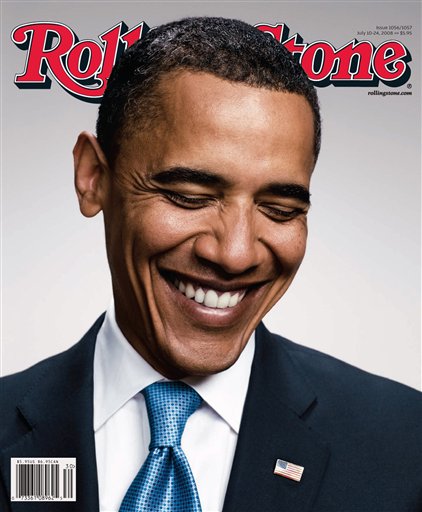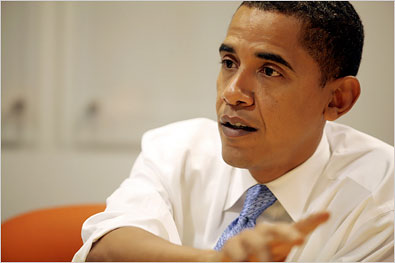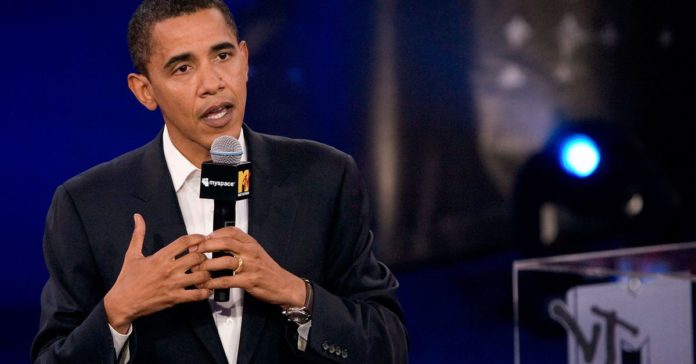Quick, which presidential candidate recently called for a huge expansion of the American military so that it can “stay on the offense” and then spelled out a plan to expand our ground forces by adding 65,000 more soldiers to the Army and 27,000 more to the Marines?
Hint: it is the same candidate who insists on the right of the President “to use force-unilaterally if necessary-to protect ourselves and our vital interests when we are attacked or imminently threatened”, denounced Iran’s “peaceful” nuclear power program, declared that the US must “prevent Iran from acquiring nuclear weapons and work to eliminate North Korea’s nuclear weapons program”, and asserted that if “aggressive diplomacy” doesn’t work, “we must never take the military option off the table.”
Those who heard Barack Obama outline his views on foreign policy in an address to the Chicago Council on Foreign Relations on Monday night heard a Democrat who sounded a lot more like Joe Lieberman or Jack Kennedy than Nancy Pelosi. His first major foreign policy address highlighted a paradox about Barack Obama that Larissa MacFarquhar discerned in her outstanding profile of him in the New Yorker.
In his view of history, in his respect for tradition, in his skepticism that the world can be changed any way but very, very slowly, Obama is deeply conservative. There are moments when he sounds almost Burkean. He distrusts abstractions, generalizations, extrapolations, projections. It’s not just that he thinks revolutions are unlikely: he values continuity and stability for their own sake, sometimes even more than he values change for the good.
Take health care, for example. “If you’re starting from scratch,” he says, “then a single-payer system” – a government-managed system like Canada’s, which disconnects health insurance from employment – “would probably make sense. But we’ve got all these legacy systems in place, and managing the transition, as well as adjusting the culture to a different system, would be difficult to pull off. So we may need a system that’s not so disruptive that people feel like suddenly what they’ve known for most of their lives is thrown by the wayside.”
David Brooks, the New York Times columnist who is conservative by the standards of that newspaper but centrist by mine, detected the same thing in a recent column.
Out of the blue I asked, ”Have you ever read Reinhold Niebuhr?”
Obama’s tone changed. ”I love him. He’s one of my favorite philosophers.”
So I asked, What do you take away from him?
”I take away,” Obama answered in a rush of words, ”the compelling idea that there’s serious evil in the world, and hardship and pain. And we should be humble and modest in our belief we can eliminate those things. But we shouldn’t use that as an excuse for cynicism and inaction. I take away the sense we have to make these efforts knowing they are hard, and not swinging from naïve idealism to bitter realism.”
My first impression was that for a guy who’s spent the last few months fund-raising, and who was walking off the Senate floor as he spoke, that’s a pretty good off-the-cuff summary of Niebuhr’s ”The Irony of American History.” My second impression is that his campaign is an attempt to thread the Niebuhrian needle, and it’s really interesting to watch.
 In Chicago this week, Obama argued against the current tides of Democratic opinion. There’s been a sharp rise in isolationism among Democrats, according to a recent Pew survey, so Obama argued for global engagement. Fewer Democrats believe in peace through military strength, so Obama argued for increasing the size of the military.
In Chicago this week, Obama argued against the current tides of Democratic opinion. There’s been a sharp rise in isolationism among Democrats, according to a recent Pew survey, so Obama argued for global engagement. Fewer Democrats believe in peace through military strength, so Obama argued for increasing the size of the military.
In other words, when Obama is confronted by what he sees as arrogant unilateral action, he argues for humility. When he is confronted by what he sees as dovish passivity, he argues for the hardheaded promotion of democracy in the spirit of John F. Kennedy.
… more than any other major candidate, he has a tendency to see the world in post-national terms. Whereas President Bush sees the war against radical Islam as the organizing conflict of our time, Obama sees radical extremism as one problem on a checklist of many others: global poverty, nuclear proliferation, global warming. When I asked him to articulate the central doctrine of his foreign policy, he said, ”The single objective of keeping America safe is best served when people in other nations are secure and feel invested.”
One reason that Obama can sound conservative is that he was trained as a community organizer on the home turf and in the political tradition of Saul Alinsky, the father of community organizing. Alinsky and his heirs trained Caesar Chavez and Martin Luther King (and me, which produced a series of unintended effects, described here). Alinsky knew how to raise hell, but he was in many respects profoundly conservative. His instincts were always to pressure existing institutions, not to start new ones.
Alinsky was a clear-eyed, unsentimental tactician who always saw the world as it existed and built upon existing community and political organizations. For example, when he arrived in a community he intended to organize, Alinsky would turn to local churches. He would appeal to ministers or priests not in terms of their Christian principles — about which he was skeptical to the point of cynicism. Instead, he appealed to their narrower interests — membership, money, or community influence. Alinsky (who also pioneered corporate shareholder campaigns) loved and believed deeply in American democratic and political institutions.
His book, Reveille for Radicals, is a manual for hell-raising within existing institutions. The book describes the need to “work inside the system” because
“(Reform) requires that the organizer work inside the system, among not only the middle class but the 40 per cent of American families – more than seventy million people – whose income range from $5,000 to $10,000 a year [in 1971]. They cannot be dismissed by labeling them blue collar or hard hat. They will not continue to be relatively passive and slightly challenging. If we fail to communicate with them, if we don’t encourage them to form alliances with us, they will move to the right. Maybe they will anyway, but let’s not let it happen by default..”
 It is perhaps silly to try to locate Barack Obama as a conservative among liberals in the manner of Reinhold Niebuhr, Edmund Burke, or Saul Alinsky but it is intriguing to see how many serious people are coming to similar conclusions about Obama’s intellectual roots. Like all of these men, Obama is an activist, not a philosopher. “The injustices in society,” Niebuhr wrote, “will not be abolished purely by moral suasion.”
It is perhaps silly to try to locate Barack Obama as a conservative among liberals in the manner of Reinhold Niebuhr, Edmund Burke, or Saul Alinsky but it is intriguing to see how many serious people are coming to similar conclusions about Obama’s intellectual roots. Like all of these men, Obama is an activist, not a philosopher. “The injustices in society,” Niebuhr wrote, “will not be abolished purely by moral suasion.”
Perhaps Obama’s greatest political influence came from another pragmatic American political philosopher, indeed another gawky Illinois lawyer, this one a highly partisan Republican. Obama opened his foreign policy talk by recalling Lincoln’s declaration that America is “the last, best hope of Earth”. If he continues to assert this, and pray he does, Obama is providing Democrats with an alternative to defeatist, xenophobic, and morally untethered foreign policy views. As the only candidate who is not visibly suffering from a foaming case of Bush Derangement Syndrome, Obama is starting to look like a man whose time has come — and not a moment too soon.






